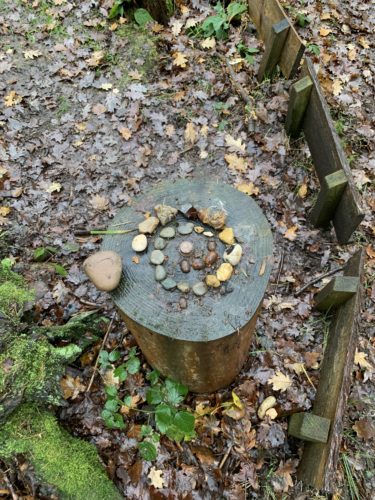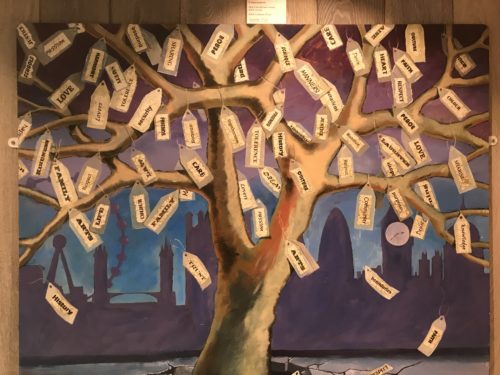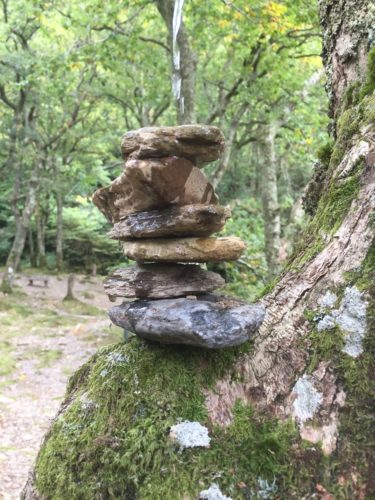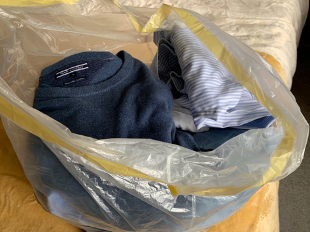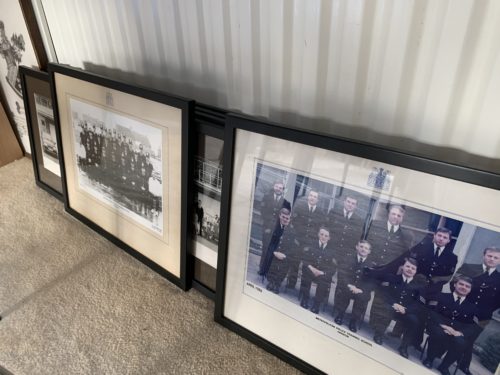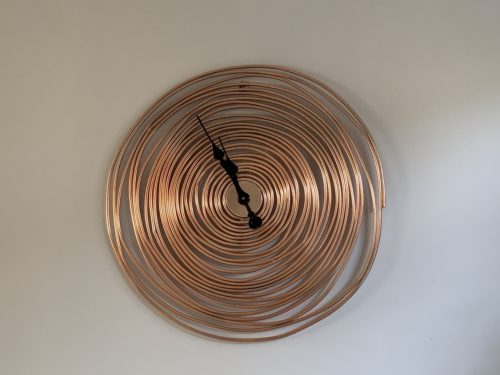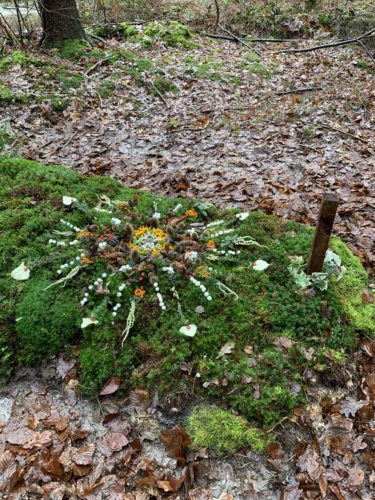
Time is slowly drifting by. It’s 12 weeks since we married. Nine weeks since Steve died. Seven weeks since his beautiful funeral. The days come and go, shorter and shorter, darker and darker, until Monday’s shortest day, the Winter Solstice. Yule, the ancient festival marking the victory of light over darkness, the end of the cycle of death and decay and the beginning of a new cycle of growth.
I spent some time on Monday creating a Solstice mandala on Steve’s grave. I was there at midday on the shortest day of the worst year of my life. Nobody else was visiting the burial ground, the rain had been so persistent that even though I was there during a brief few hours without rain, every gust of wind sent a shower of raindrops down from the branches above. My only companions were a pair of deer tentatively browsing among the undergrowth. The only sounds were the pattering of falling droplets and some occasional birds sounding alarms or singing in the distance. It was good thinking time, as I let the pattern emerge, picking berries and fir cones and leaves from my bag full of foraged natural beauty that I’d been collecting over the previous week.
As I worked, I let my thoughts drift. I don’t have any yardstick to measure where I am or how I’m doing. People ask me how I’m doing a lot. And I usually take a moment to try and work it out. Mostly I think I’m ok. And occasionally I’m very, very not ok. As I laid handfuls of holly berries on the moss covering Steve’s grave, I thought back to Friday last week, the last time I was not ok.
I had volunteered to donate plasma after my positive test when Steve was diagnosed with Covid 19 at the end of September. A nice lady had eventually phoned me at the beginning of December and asked all of the screening questions, eventually telling me I was suitable to be tested for antibody levels to see if I had sufficient to become a donor. The appointment had to be delayed while I went into a second bout of isolation after my grandson brought Covid home from a supply teacher, and shared it with his mum and siblings, but the appointment was set for the 18th.
I hadn’t really thought through how I would feel until I was driving to the blood donor centre in Edgeware. It was the first time I’ve driven anywhere that I hadn’t been to before since Steve died, and I was aware that this made me feel a bit nervous. When I found the centre, I parked the car and walked in and then was suddenly hit by a wave of emotion that I found hard to push down.
It was the first time I had set foot in a hospital since he died. Before he was taken to the hospital where he would battle against Covid, I had accompanied him to every single appointment at every single hospital, from the day he was first investigated for cancer. Every single one. Even when I wasn’t allowed to go in with him to see the GP or consultant, I went as far as I was allowed, and then waited, in a corridor or in the car. And now suddenly I was in a hospital again, on my own. I found that I was shaking.
I managed to compose myself behind my mask and sat in a corner trembling slightly, waiting to be called. A lovely Irish nurse came and got me, and took me into a room and started sorting out the pin prick test and the phials for blood, chatting away as she did. And then she asked me if I knew how I’d contracted Covid. I told her that we thought that Steve had contracted it at a hospital appointment and then passed it to me and some other close family members. Of course, she asked if we were all ok. I hesitated a moment, and then I told her. She looked at me in horror, and started to cry, and to hold my hand and thank me and bless me and told me how brave I was to have offered to donate plasma after losing him. And I cried too and couldn’t stop. The two of us just sat in this little room while I cried with a kind stranger, a nurse who was in the front line of contracting Covid every single day. It was the first time I had had to identify myself, to define my new self in the light of what has happened, to tell my story to someone who had no idea. And it was really, really tough.
It didn’t get any easier even when I had managed to stop crying and sniffing – lovely Maureen whispered to a colleague about ‘the lady over there’, and for the whole of the next forty minutes while I was in the centre, nurse after nurse quietly approached and came over and gently offered their condolences and their thanks. My head was scrambled at this. They were thanking me? These wonderful NHS staff who were putting their lives and their families’ lives on the line just by going to work every day while the virus rampaged through the community, they were taking the time to come to me and say how sorry they were for my loss.
It was too much kindness, if there can be such a thing, and I sat back in the special chair with hot tears just rolling down my cheeks into my mask, probably rendering it completely useless. There was nothing I could do to stop the waves of deep, deep sadness.
When they had drawn enough blood, I left and drove home slowly, aware that I probably wasn’t in the best head space to be on the road and came home and just sobbed. The kindness of strangers was overwhelming, it had unlocked a dam that had obviously been building inside me for days and weeks.
I let myself think over this as the mandala reached completion. The pressure of living in grief, during the resurgence of the virus, listening to constant dreadful news, worrying about the new Tier 4 (in which I and all my children are now living) the cancelling of Christmas, the lorries causing Kent to come to a standstill, the borders closing against the UK, the approaching Brexit deadline with the very real possibility of no deal, the queues, the food shortages – as I write this, on the 22nd, everything is chaotic and broken. Nothing is normal, for anyone. Nothing will ever be normal again. Now even the faint feelings of hope – of the vaccine on the horizon, of my having antibodies that might help keep me and my family safe as we face the winter months ahead – has evaporated with news of the virus mutating and the questions about whether this new strain will be even deadlier than the first. Life feels precarious and dark and lonely and fearful.
And yet
In the kindness that tipped me into tears last week, there was a reminder that everything cannot stay dark and fear-filled forever. We are all bruised and numb and afraid, scarred by the experience of living through a pandemic. Ten months of fear and worry is etched into our national identity. Sometimes it explodes out in anger and denial, in refusal to comply with rules, to wear a mask and to stay apart from others, in belief in conspiracy theories and nanotechnology and 5G masts and all sorts. Other times, in other people, it is absorbed into the DNA, the thoughts, the anxiety, the strain. The isolation and loneliness. Many of us are bereaved and grieving while trying to cope with the unbearable pressure of everything having changed. And amidst all of this, there are kind people everywhere, behind the masks that we now have to wear.
There is such symbolism in those words. Behind the masks. Behind the masks there is compassion and caring and kindness and love. It takes just a second to see it when you need it.
As I stood and looked down at Steve’s grave and the beautiful pattern that had emerged from my bags of berries and leaves, something shifted. The tears came again, and I walked crying through the silent dripping trees and found the labyrinth. I had helped create it when I worked at the burial ground, and after Steve’s funeral we had walked it with the children and dog, drinking champagne and etching a memory of that day in all our minds.
I entered the mouth of the labyrinth, and walked carefully on the slippery mud, carrying a stone in my hand, thinking my sad thoughts – as we have taught the children. It takes a while to walk the meandering pathways, and your thoughts settle as you make your way to the centre, back and forth in a walking meditation.
When I reached the centre, I spent a few minutes on my own. A robin sang somewhere nearby, but otherwise all was still and silent. A memory drifted up into my mind. It was so clear. I remembered seeing Steve walking up the path to find me there, working in the labyrinth, on the morning of his father’s funeral in 2010. I could see him walking towards me smiling, with his strong stride, smart in his suit and black tie and beautiful black overcoat. It was a lovely memory, and I found myself unexpectedly smiling at the thought, at him smiling at me right there. For the first time, I was feeling a memory that wasn’t accompanied by the prickling feeling of sadness, the weight of loss that has come every time I try to think back to happy times.
I looked down at the little tree stump in the centre of the labyrinth, the destination that you walk to thinking your sad thoughts, where you leave the stone and all your sad thoughts behind and walk out again lighter and stronger. A jumble of stones and coins left by others who had walked to the centre littered the damp wood, with saturated leaves and twigs. It looked uncared for and purposeless, so I rearranged everything into a pattern that I liked, and then traced my way back out of the labyrinth and walked back to the car.
The clouds above me didn’t break, but something inside me was content. Some order had been returned. There are patterns everywhere. There is light after darkness, always.
